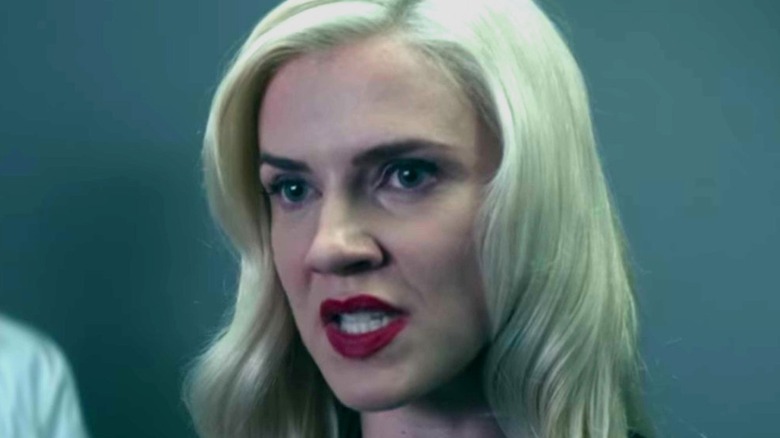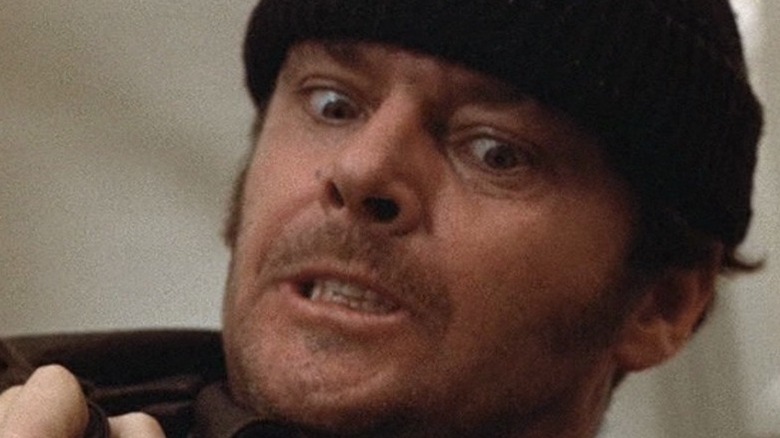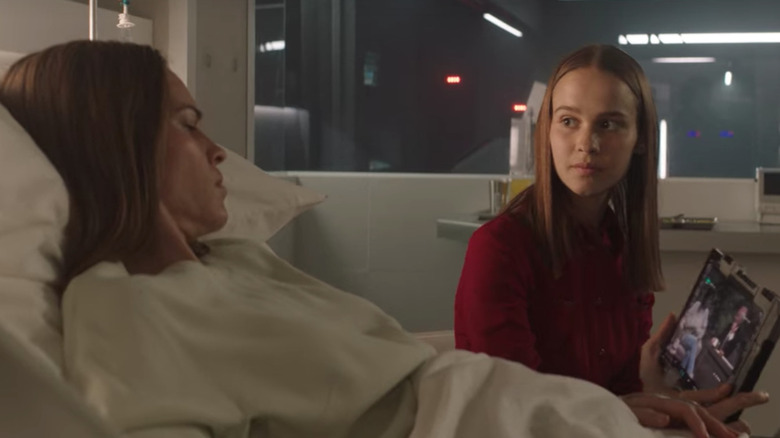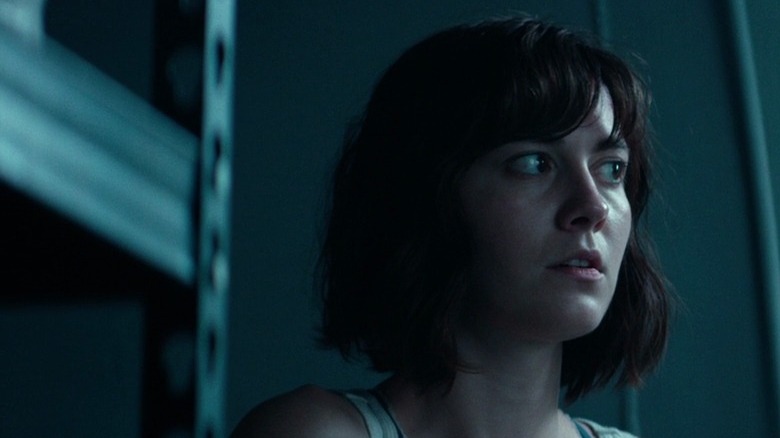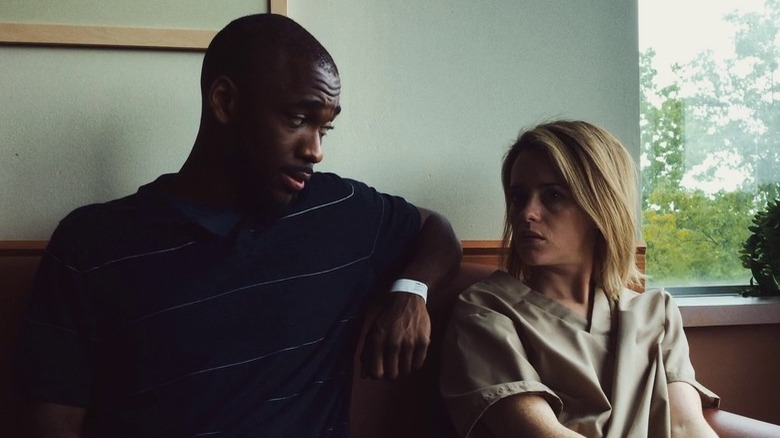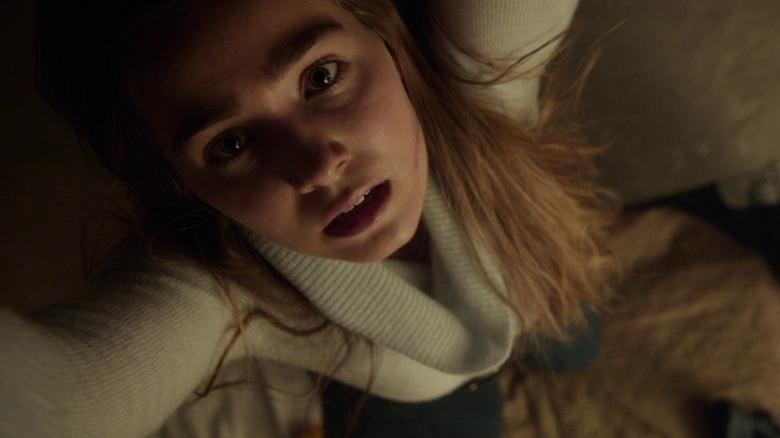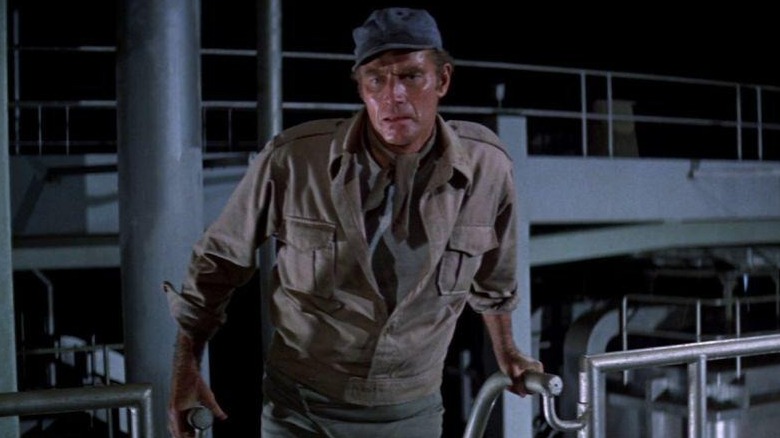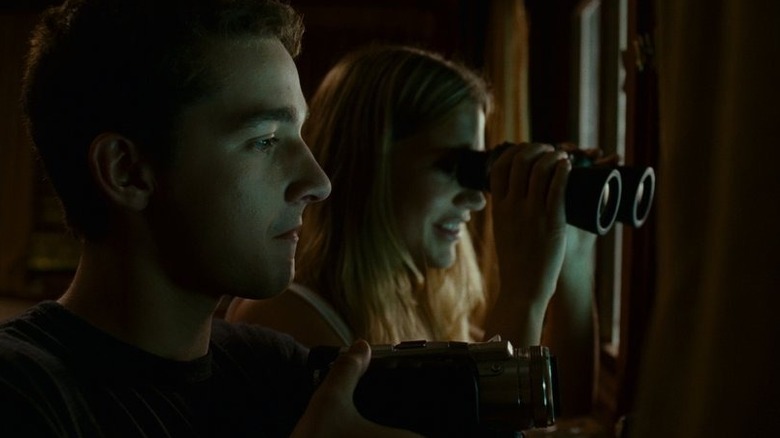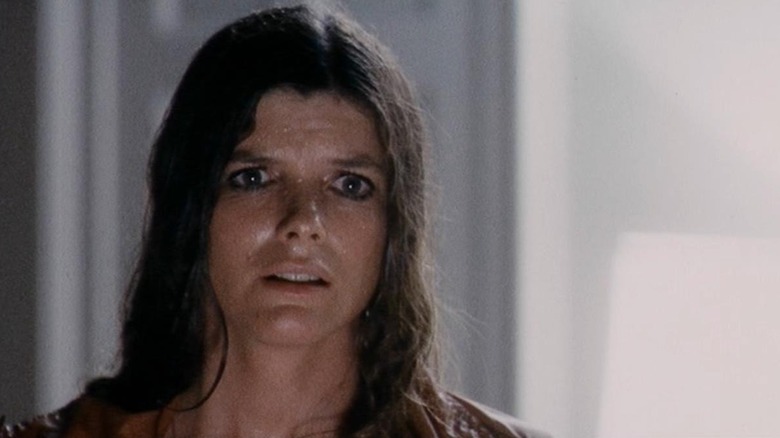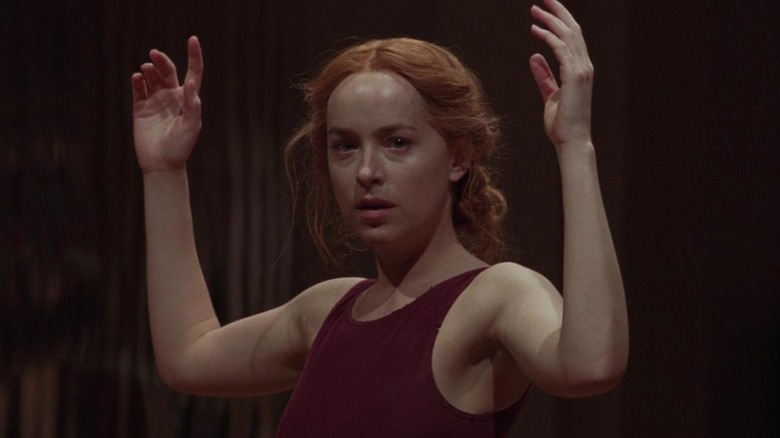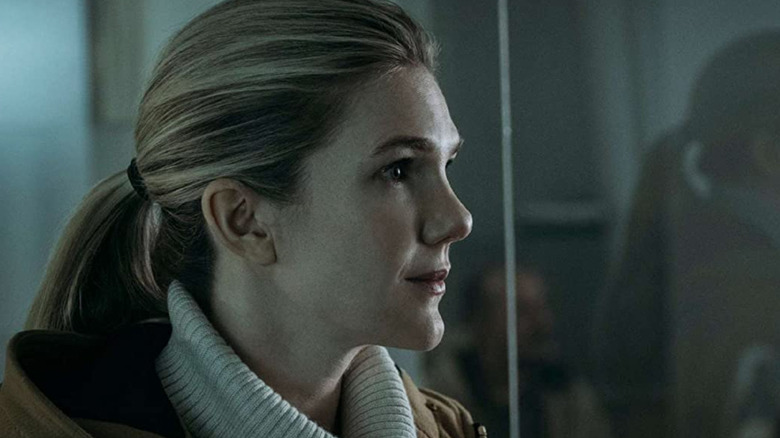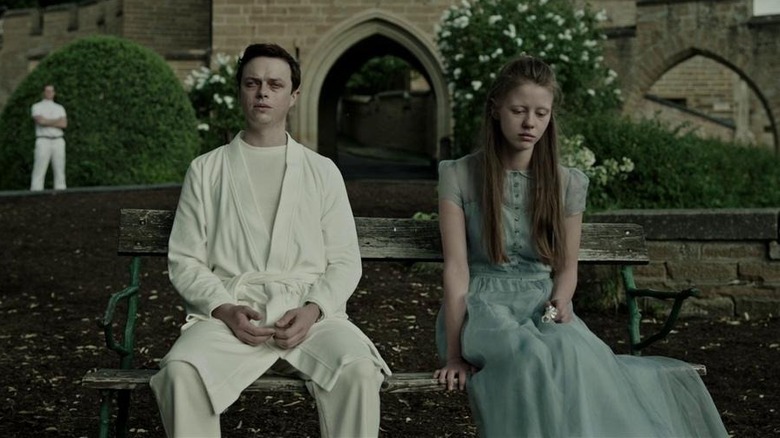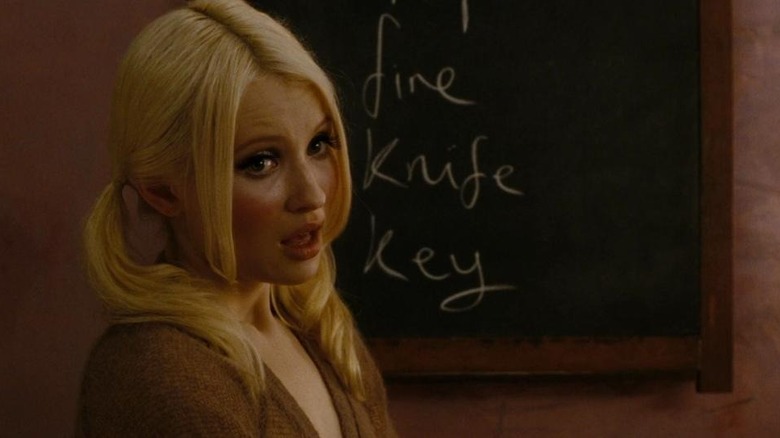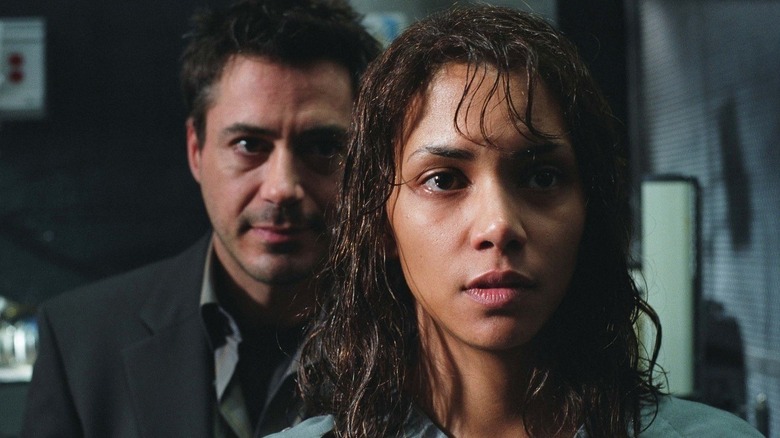Movies Like Level 16 That Thriller Fans Need To See
What if you learned that your whole life was a lie? What if everything you'd ever believed was turned on its head in a single moment? Some of the best thrillers to date ask these types of questions and expertly deliver clever narratives laced with mystery, suspense, and paranoia. One such film is "Level 16" — a modern look at humanity and servitude through the eyes of young women in captivity.
Danishka Esterhazy's dystopian adventure gets to the bottom of what's going on at The Vestalis Academy, a boarding school that houses girls from childhood through adolescence. If you asked the students about the school, they'd tell you how it's designed to shape them into flawless young women. The girls dream of being adopted by perfect families when they reach age 16 and believe their obedience is the key to happiness. With graduation fast approaching, a cunning old friend makes Vivien (Katie Douglas) start to question the motives of the instructors she's always trusted.
For young audiences, "Level 16" is a gateway into the wonderful worlds of psychological thrillers and feminist horror. It explores a number of chilling ideas: the plight of young women in a patriarchal society, realities founded on illusory truths, and underdogs battling oppression. For fans of this Twilight Zone-esque brand, the following social thrillers aim to captivate budding filmgoers, genre-newcomers, and lovers of all things suspense.
One Flew Over the Cuckoo's Nest
"One Flew Over the Cuckoo's Nest" is a classic depiction of institutional oppression and willful rebellion. This 1975 film features an antagonist cut from the same cloth as Miss Brixil and an institution that employs problematic methods of control. The story questions who should be allowed to define sanity and madness. It questions what should be allowed to define control and compassion — humans or institutions.
We follow the recently convicted McMurphy (Jack Nicholson) and his stint in a mental institution under the thumb of Nurse Ratched (Louise Fletcher). Tensions between the two send shockwaves through the facility and change the lives of all the patients inside. It's a dark snapshot that captures the volatility of life in confinement.
In "Level 16," Miss Brixil would lock girls away inside a tiny cell not even big enough to stand in. Her rash punishments mirror Nurse Ratched's methods: In "One Flew Over the Cuckoo's Nest," Ratched's team delivers electric shock therapy to McMurphy in a gripping scene meant to keep its audience on pins and needles.
This movie relies more on dramatic dialogue to convey its message while "Level 16" focuses on suspense. That said, "One Flew Over the Cuckoo's Nest" sets the precedent for modern social thrillers, and its story holds up to this day: You can trace many themes of the genre back to this story of authoritarianism. The film's ending will leave you pensive, heavyhearted, and maybe even disturbed.
I Am Mother
A protagonist known only as Daughter (Clara Rugaard) believes herself to be the last person on Earth in Grant Sputore's 2019 film "I Am Mother." Humanity has reached extinction, and Daughter is being raised in a bunker by an android as part of a mission to repopulate the planet. The story compares and contrasts the ways in which ethical decisions are made by humans and artificial intelligence.
Mother (voiced by Rose Byrne and played by Luke Hawker) explains to Daughter how air in the outside world is contaminated and could be potentially lethal. Like "Level 16," the story is primarily set in one restricted location. The main characters stay inside because they're taught to believe that only death lies beyond the front door. Although the shelter in "I Am Mother" has a seemingly endless supply of food, medicine, and technology, it's nonetheless prison-like. There are no windows — only artificial light. For both the characters and the audience, the sense of time is distorted, adding to the suspense.
When Daughter reaches her teenage years, she — like Vivien — encounters a character with reality-shattering information when a wounded woman (Hilary Swank) shows up at the bunker. This woman has a dramatically different perception of who Mother really is, and this forces Daughter to question her own purpose, judgement, and allegiance to the "family." Once Swank's Woman arrives, nearly every scene transitions into another with a twist — leaving the audience unsure of whose side they're on until the very end.
10 Cloverfield Lane
After a brutal car accident, Michelle (Mary Elizabeth Winstead) wakes up in a doomsday bunker with two men. They contend that some sort of attack has made the air outside too dangerous to breathe, telling Michelle that they'll have to remain underground for at least a year or two before life on the surface can be remotely safe. The story they tell is actually conceivable, but our protagonist can't help wondering if she's been deceived — held captive in a basement with no way out.
The confined setting of "10 Cloverfield Lane" creates the perfect atmosphere in this tension-fueled story about trust and survival. Like in "Level 16," a young woman is controlled by men through fear, and she has to use her skills, strengths, and smarts to survive. The threat of unclean air is enough in and of itself to make audiences of both films feel the inherent claustrophobia experienced by the main characters.
The whole movie is a really refreshing take on a concept we may have seen before, and it keeps its audience guessing until the credits roll. The uncertainty of the threat, including of whether one even exists, maintains the suspense from start to finish. John Goodman steals the show as Howard and serves as a strong enigma for Mary Elizabeth Winstead's Michelle.
Unsane
You'll want to root for Sawyer Valentini (Claire Foy) in the 2018 psychological thriller "Unsane," but is she out of her mind? According to The Film Stage, Steven Soderbergh directed and shot this movie in secret on an iPhone about a year and a half before its release. His cinematography techniques result in an uncommon and delightfully unsettling watching experience.
The story follows Sawyer after she unknowingly checks herself into a 24-hour observation stay at the Highland Creek Behavioral Center while simply visiting a therapist. During her time there, she becomes convinced that a dangerous stalker she'd moved hundreds of miles to escape from is working in the facility as an orderly. The staff begins to question her state of mind, and the initial 24-hour session soon becomes indefinite.
A character named Nate (Jay Pharaoh) introduces a conspiracy theory about the center to Sawyer when she's processed in. Despite making a new ally, Sawyer's attempts to escape are thwarted by her frequent outbursts and the unapproved drug regimens issued by the staff. Like "Level 16," this movie has all the fixings of a great thriller set in a care institution: mysterious characters, manipulative mind games, and a seriously unexpected twist. It has both an intriguing aesthetic and a little something to say about the American healthcare system.
Split
In M. Night Shyamalan's "Split," three teenage girls are abducted by Kevin (James McAvoy) — a man who shifts between multiple personalities. His disorder stems from childhood abuse and is managed by his therapist, Dr. Fletcher (Betty Buckley). While the plot of the film is derived from Kevin's condition, the action is driven by the plight of the kidnapped girls.
Casey (Anya Taylor-Joy) leads the trio through a flurry of attempts to make it out of Kevin's bunker alive. She learns to manipulate Kevin's different personalities in order to learn more about what the girls' predicament — just as Vivien always comes closest to success in "Level 16" when she's able to manipulate Dr. Miro (Peter Outerbridge) into sharing tidbits of information about the secrets of The Academy. Miro believes he's fooling his student, but the game is being played on both sides.
"Split" is a very unique thriller that spotlights the challenges of coping with abuse and managing mental disorders. As a result of these complicated themes, the girls have to solve their predicament like a puzzle to avoid falling victim to Kevin's most dangerous personality: The Beast.
Soylent Green
Does this sound familiar? In 2022, the world faces serious food, water, and housing shortages because of overpopulation, pollution, and climate change. This isn't a news headline — it's the backdrop of the 1973 sci-fi thriller "Soylent Green." Like "Level 16," it's a depiction of a not-so-distant dystopian future with a similar morbid twist.
In a New York City society where the divide between the poor and the elite is profound, a detective named Frank Thorn (Charlton Heston) investigates the murder of a wealthy Soylent Corporation board member. The Soylent Corporation creates the food supply for most of the population, but as Thorn opens more doors, he begins to uncover a shocking and infamous piece of information regarding their production methods.
Watching "Soylent Green" today offers viewers the chance to reflect on its star's unfortunate legacy: Heston's real-life political flip-flops and open displays of cruelty after the Columbine massacre (per The Baltimore Sun) contrast with his character's search for humanity and inevitable gun-related demise. But perhaps the most disturbing element of a modern "Soylent Green" viewing is realizing that it's meant to take place in the year 2022. Its dystopian-future landscape is positioned disquietingly at the heart of contemporary times. The fact that audiences can now compare and contrast their current realities with the fiction of yesterday is a scary little fourth-dimensional special feature.
Disturbia
Authors who write young adult thrillers know how to keep their teenage audiences turning pages: They add psychological elements, keep the mystery mature, and integrate coming-of-age storylines. These devices also make for a great movie in general, so a good young adult thriller will more than likely be exciting for teens and adults alike. The style creates a sense of nostalgia, and adults can appreciate watching characters with fresh perspectives.
In "Disturbia," a teen named Kale (Shia LaBeouf) is placed on house arrest after he has an outburst related to the recent death of his father. During his time spent at home — alone and bored — Kale starts to spy on his neighbors. What begins as a harmless pastime soon evolves into an all-out criminal investigation when Kale begins to suspect that his neighbor is a dangerous serial killer. He recruits his best friend and the new girl next door to help him learn the secrets of the eerie Robert Turner (David Morse) — and save his mom (Carrie-Anne Moss) from potentially being the next victim.
Like "Level 16," "Disturbia" is propelled by a cast of talented teenagers. It's a story that could be about adults, but is made a little more fun by the age of its protagonists. The movie strikes an impressive balance between genuine comedy, nail-biting action, and bona fide scares.
The Stepford Wives
The creepy 1975 film "The Stepford Wives" is based on a book of the same name. As the story goes, a young woman named Joanna (Katharine Ross) leaves the big city to live a quieter, small-town life with her family. Much to her surprise, she finds that virtually all the other wives in Stepford seem to be empty shells. They simply exist as living representations of old-fashioned, feminine ideals projected through the male gaze. As Joanna meets more residents and sees her family dynamic begin to change, she teams up with a new friend to investigate their neighbors' strange behavior. It's clear as the film progresses that a nefarious discovery is on the horizon.
If you've seen "Level 16," you know that the desires and actions of the Stepford Men's Association toward women align closely with those of The Vestalis Academy. Both filmmakers take a jab at widespread, systemic misogyny and its effects. The ways in which the two organizations value beauty and the means by which they attempt to shape young women into submissive, docile beings are more than comparable: The thriller genre is the perfect vessel with which to tell these kinds of alarmingly relevant stories.
Suspiria
Dario Argento's "Suspiria" is well-known for its striking visuals, iconic style, and unforgettable soundtrack. In 2018, his cult-classic hit was reimagined by director Luca Guadagnino as a new brand of thriller that explores themes of power, motherhood, and malevolence. Akin to "Level 16," the film features a bleak, muted color palette and a relatively cloistered, virtually all-female cast.
It's 1977 in Berlin, and Susie Bannion (Dakota Johnson) auditions at the Markos Dance Company. Many mysteries surround missing girls and a supernatural matriarchy at this institution, but Susie seems to thrive in her new home despite this drama. Her rise through the ranks and attention from the matrons spell trouble for her peers.
If control over women's bodies was among the most thought-provoking concepts in "Level 16," the use of host bodies through witchcraft in "Suspiria" is sure to catch your attention. This is a movie with a lot of ideas — and lots of room for interpretation. Every watch is just as gripping and seemingly reveals a new morsel of information.
Paradise Hills
Uma (Emma Roberts) wakes up in a beautiful sanctuary on a remote island in this fantastical thriller from 2019. The island looks more like a resort than a reform school, but its purpose is to transform its subjects into amiable, obedient specimens by the time they return home. It's essentially a dark fairy tale with a message about the importance of individuality.
This film's Miss Brixil character comes in the form of the island's proprietress, who's seemingly half dryad, half drill sergeant. Like the "Level 16" character played by Sara Canning, The Duchess (Milla Jovovich) is both alluring and intimidating — making her a complex villain with a backstory audiences will be dying to uncover.
After refusing to marry an upper-class boy hand-picked by her parents and being sent away to Paradise Hills, Uma cautiously falls in line under The Duchess' direction while secretly plotting to escape with her peers. Like in "Level 16," the protagonist learns that when the girls fall asleep, they aren't always kept in their rooms. The true intentions of Paradise Hills are unmasked at night, but staying awake to investigate isn't so simple when the rulers control the food (and what goes into it).
Mystery, romance, and stunning visuals decorate this imaginative adventure that follows a group of girls refusing to conform at all costs. The movie raises the stakes every time a new question is answered and comments on the antiquated — but not eradicated — ideal of what a young woman should be.
Fractured
A mother, father, and daughter find themselves visiting a hospital after an accident out on the road. The father, Ray (Sam Worthington), falls asleep in the waiting room after his wife, Joanne (Lily Rabe), accompanies their daughter, Peri (Lucy Capri), down to a lower level for a CT scan. When he wakes up and asks the hospital staff if they can show him to his family, he's told that they were never admitted and that he entered the hospital alone.
Catapulted into a conspiracy and frantic to find his family, Ray desperately tries to uncover what's going on at this hospital. In the same way that we don't know who can be trusted in "Level 16," Ray's seemingly unreliable perspective heightens the suspense as he makes his way closer to the truth.
In his determination to find Joanne and Peri, he trusts his gut, ups the ante, and fights his way to the hospital's basement — but protagonists never find anything good in a basement. This climactic scene mirrors one of the most compelling revelations in "Level 16" when Vivien and Sophia (Celina Martin) make their way down to The Academy's bottom floor. Reality is presented in a new way in moments like these, moments that shock and intrigue audiences and leave them thinking long after the movie ends.
A Cure for Wellness
There is a so-called wellness center perched high in the Swiss Alps with a deep, dark history. A stockbroker named Lockhart (Dane DeHaan) is sent there by his company's board of directors with a single objective: retrieve their AWOL CEO. When Lockhart arrives, he's met with resistance and eventually finds himself as a patient in rehabilitation himself, unable to leave the premises and questioning his own sanity.
The residents at the spa all seem to be suffering from the same mysterious illness and long for the cure. Uncovering the truth could be the key to Lockhart's emancipation, so he undertakes a reality-bending investigation — finding one shocking twist after the next.
Just like with "Level 16," the biggest scares in "A Cure for Wellness" arise from the protagonist's climactic revelation. When the veil is lifted, the creepiness built up to that point is both validated and elevated. The figures of authority in these stories have malevolent motives that are wrapped up in the physical bodies of their residents. Both films explore this terrifying storyline and execute twists that make the heroes' circumstances even more treacherous.
Sucker Punch
Zack Snyder's "Sucker Punch" centers around Babydoll (Emily Browning), a young girl who is framed by her evil stepfather and sentenced to a corrupt institution for the mentally insane. To keep her quiet, the stepfather (Gerard Plunkett) arranges to have Babydoll lobotomized.
Reality begins to distort as she crafts her escape plan with her four new friends (played by Abbie Cornish, Jena Malone, Vanessa Hudgens, and Jamie Chung), and the audience is transported to an ever-changing fantasy world as Babydoll dissociates from real life. This coping mechanism morphs the narrative's setting into a brothel where the girls are to present their bodies to wealthy clients — much like the innocent pupils in "Level 16." The adventure expands as "Sucker Punch" walks a line between empowerment and exploitation.
This film is an underrated, action-packed thriller. Zack Snyder's signature visual style is at its most ambitious, and the movie's set pieces are like nothing you've ever seen before. Its story is carried by an incredible cast, and there are no skips on the show-stopping soundtrack. At the end of the day, it's a fun movie about battling guards and the unbreakable bonds of sisterhood — and it encourages women to tell their own stories wherever they can.
Gothika
Another film that strings audiences along through a dark, dreary asylum setting is the supernatural thriller "Gothika" from 2003. In the movie, we watch Miranda Grey (Halle Berry) — a psychiatrist at Woodward Penitentiary — struggle to make sense of her inexplicable incarceration in the very women's ward where she works every day. Like Vivien, Dr. Grey tries to escape institutionalization, solve a conspiracy, and exonerate herself all at once.
After a car accident one night, Dr. Grey wakes up to find herself locked down. Her colleague, Dr. Graham (Robert Downey Jr.), tells her that she's the only suspect in the violent murder of her husband (Charles S. Dutton) — a tragedy she knows nothing about. A character à la Sophia of "Level 16" comes in the form of Chloe Sava (Penélope Cruz), a patient Dr. Grey used to treat. Chloe transcends her perceived mania and acts as a vital source of information. Stories she told as a patient, once dismissed, now offer clarity to the disgraced doctor.
"Gothika" is nothing short of suspenseful, and its chilling tone is unrelenting. True terror comes from the fact that even if Dr. Grey tells the truth, no one will listen. As it navigates this impossible problem, the story's themes of possession, liberation, and vengeance set the stakes high and keep the tension wound up tight through the final act.
